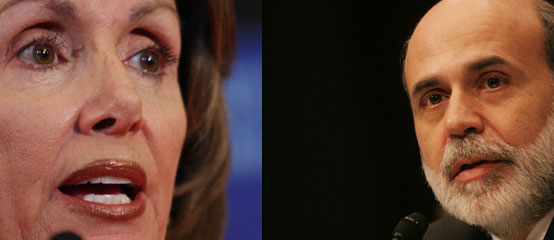Conservatives Blast Stimulus Deal
How seriously do Washington policymakers view current economic troubles? It has taken just days for congressional Democrats to agree with their GOP colleagues
Jul 31, 2020110.9K Shares2.2M Views
Photo credit: Lauren Burke, WDCPix
How seriously do Washington policymakers view current economic troubles? It has taken just days for congressional Democrats to agree with their colleagues and the White House on a proposed solution.
The Bush administration and congressional leaders agreed Thursday to a $150 billion economic stimulus proposal that would give direct rebates to low- and middle-income Americans while lending significant tax breaks to businesses.
Supporters say this will rejuvenate the economy in the middle of a housing crisis that many experts fear could sour the entire economy. That concern has created an urgency among policymakers to enact a quick solution. It has also united Democratic and Republican leaders in a way rarely seen in this Congress.
Illustration by: Matt Mahurin
“Our goals were to provide working Americans who are struggling in these difficult economic times with timely, targeted and temporary relief,” House Speaker Nancy Pelosi (D-CA) said, “and to quickly give our economy a shot in the arm. We have accomplished both goals.”
Under the final proposal, individual taxpayers would be eligible for rebates up to $600 this spring, with couples eligible for as much as $1,200. Families receive $300 per child.
A number of economists argue that low- and middle-income earners are most likely to turn around quickly and spend their rebates, supplying the retail economy with the immediate boost they say it needs. As a result, individuals earning more than $75,000 — and couples making more than $150,000 — would not qualify for the rebates.
“Most of the money given to low and middle income households will get spent,” said Martin Feldstein, Harvard University’s George F. Baker professor of economics, who was chief economic adviser in the Reagan administration, responding in an e-mail.
In a deal with congressional Democrats, negotiators agreed to include rebates for low-income workers earning too little to pay income tax, but who still contribute to the Medicare and Social Security programs through payroll taxes. In return, Democrats allowed a larger portion of the stimulus proposal to target businesses. About a third of the package will allow businesses that buy new equipment this year to expense an additional 50 percent of the cost.
But even as the White House and congressional leaders are claiming victory, some economists are questioning both the wisdom and timing of the chosen model.
Free-market conservatives are especially up in arms about the package. Many wondered why the White House — which has shown no reluctance to buck the Democratic Congress when it comes to stem cells, troop withdrawal timelines and children’s health — was so quick to compromise its conservative principles with direct worker rebates.
“We think it’s silly and stupid,” said Ryan Ellis, tax policy director at American’s for Tax Reform, an anti-tax advocate. “If you end up like that because the Democrats made you do it, that’s fine. But don’t come out and negotiate with yourselves.”
Brian Riedl, senior policy analyst at the conservative Heritage Foundation, echoed that sentiment, arguing, “tax rebates fail because they don’t encourage productivity or wealth creation. No one has to work, save, invest or create any new wealth to receive a rebate.”
“All this talk about the stimulus is just crap — just political crap,” said Lawrence Hunter, an economist with the Institute for Policy Innovation, a Texas-based conservative think tank. “I thought, at least among conservatives, that we’d come to understand that that doesn’t work.”
While the rebate plan has received the blessing of leaders in both chambers, there are signals of dissension in the lower ranks. The Republican Study Committee, the caucus of House conservatives, has attacked the White House stimulus plan from the outset, contending that long-term tax cuts — not short-term rebates — are the better way to improve the economy.
“Conservatives know that it is never a bad time to let families keep more of their own money,” Chairman Jeb Hensarling (TX) said in a statement. “However, temporary consumer tax rebates should not be confused with economic stimulus.
On Tuesday, Sen. Arlen Specter (R-PA) introduced legislation to accelerate the tax benefit of new business equipment, allowing businesses to claim 100 percent of the equipment’s value in the first year of use, rather than spreading the deduction over the current three-, five- and seven-year schedules. That, conservatives say, would produce both immediate and long-term economic results. “By allowing firms to deduct the cost of a new asset in year one, expensing spurs new investments quickly, which helps to drive immediate job creation,” Specter said from the Senate floor Tuesday.
Supporters of the stimulus package argue that such changes alone would not produce results as immediate as those gotten by targeting working class Americans with cash rebates.
But many conservative policy analysts dispute that claim, arguing that those low- and middle-class populations are also most likely to suffer from credit card or other form of debt. Instead of buying shoes and VCRs, these analysts say, rebate recipients will put their checks toward their more pressing obligations. Policymakers who think rebates will produce an economic turnaround are delusional, said Ellis, the anti-tax advocate. “They’re not going to get it.”
On Tuesday, Treasury Secretary Henry M. Paulson defended the rebate strategy to an audience at the U.S. Chamber of Commerce. He said the current housing crisis was “inevitable after years of unsustainable home price appreciation,” but the economy can be spared considerable damage if the stimulus plan is enacted quickly, affects a broad swath of the population, and remains temporary. Perhaps anticipating criticism from the right, he was quick to emphasize this is a one-time proposal.
“Our focus on short-term growth,” Paulson said, “does not supersede or minimize our commitment to the economic policies which we know to be in our country’s long-term best interest — a pro-growth tax system, entitlement reform and a balanced budget.”
Whatever the solution, most economists agree the country is headed for a tough stretch. In December, only 18,000 new jobs were created nationwide, nowhere near the 70,000 projected by industry analysts. That month, the unemployment rate jumped to 5 percent, up from 4.7 percent the month before, according to the Labor Department. Combined with oil prices flirting with $100 per barrel and a decline in retail spending — as evidenced by a lackluster holiday shopping season — there has been pressure on Washington to inject a dose of consumer confidence, with hopes that it becomes epidemic.
Aiming to avert the decline, Federal Reserve Chair Ben Bernanke announced Tuesday that the reserve board was clipping interest rates three-quarters of a point, down to 3.5 percent, the sheerest one-time drop on record. That move reversed the market’s free fall, although some critics are questioning whether a strategy of creating cheaper credit is the wisest way to address a crisis that was caused, in part, by cheap credit.
Timing has also become an issue, as a number of financial experts indicate that Congress has an unflattering history of reacting slowly to economic downturns. Michael Sampson, a professor of economics at American University, said lawmakers usually react to sharp fluctuations in the stock market, like those occurring now, but “it’s too late. By the time the checks arrive, the problem will probably have fixed itself.”
The rebate strategy has also led to charges of political pandering—for neither party wants to bear the blame for a sinking economy in the middle of a high-stakes election year. “The bad parts of the debate have November in mind,” Ellis said, referring to the direct rebates. “It’s as old as the Romans giving out free bread to the masses.”

Paula M. Graham
Reviewer
Latest Articles
Popular Articles

